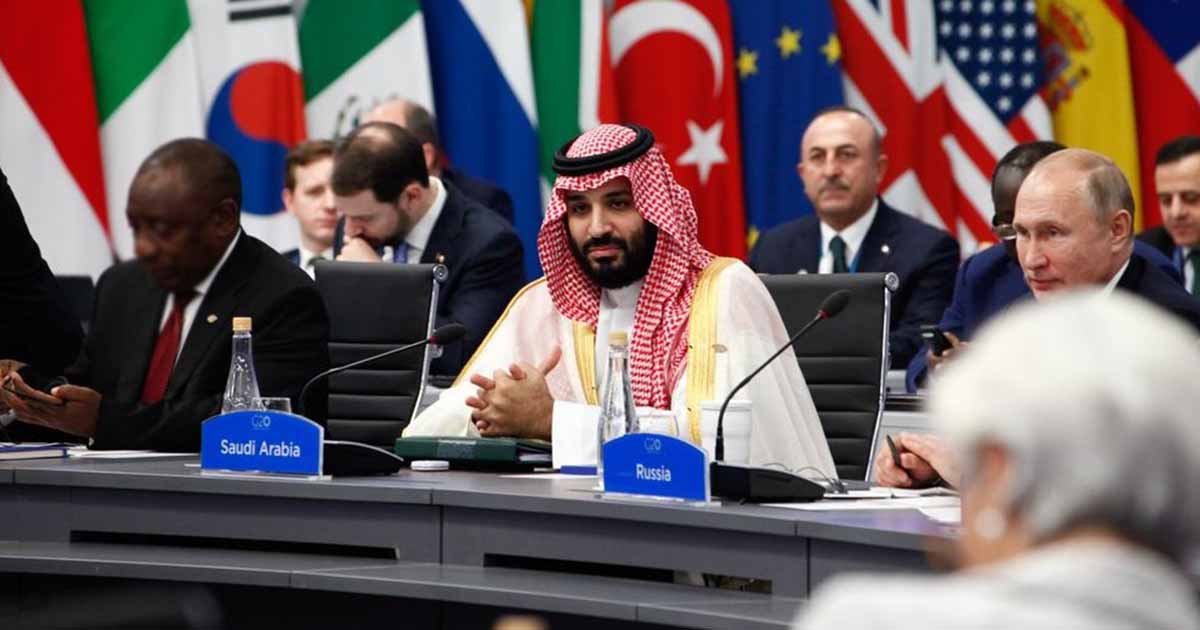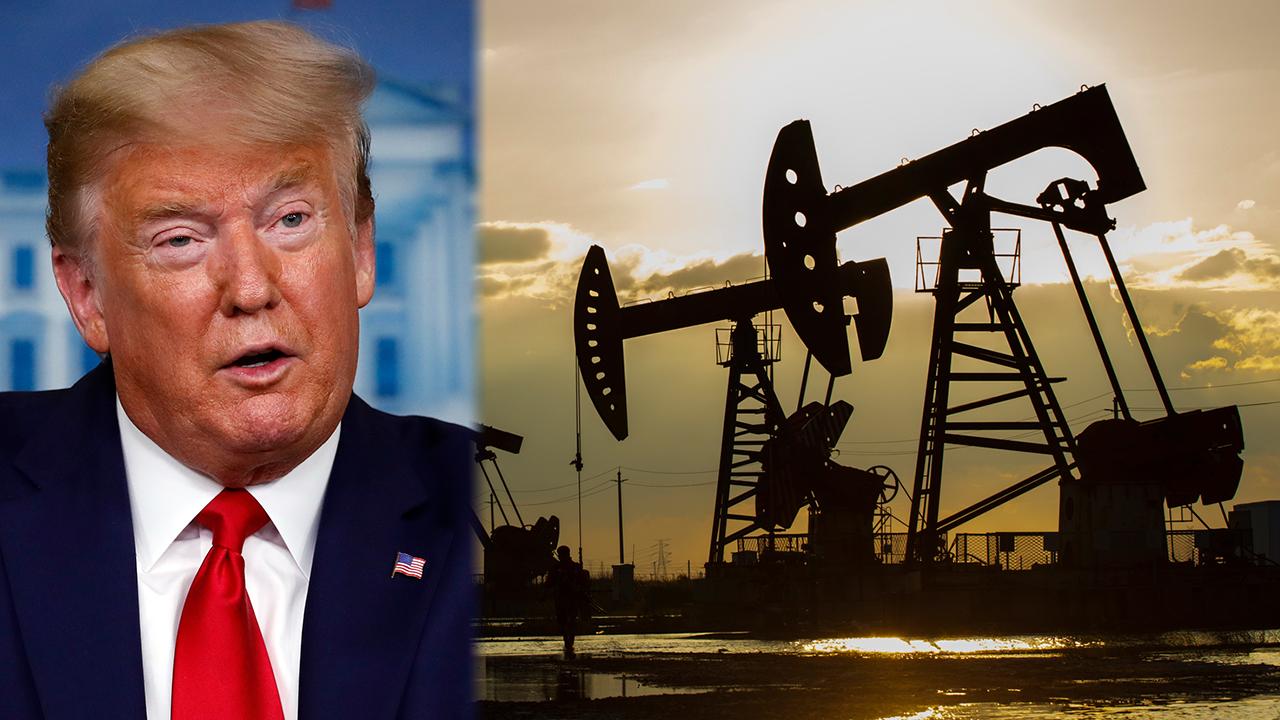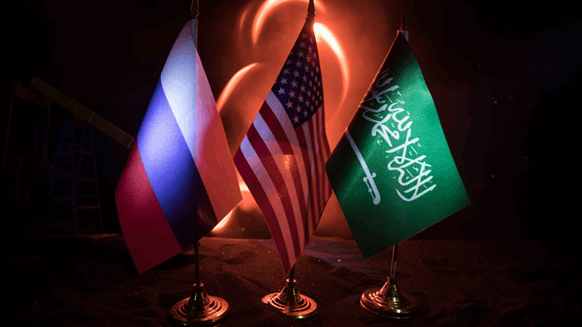What will be the consequences of Crown Prince Muhammad bin Salman's bitter rhetoric against President Trump and Putin?
What will be the consequences of Crown Prince Muhammad bin Salman's bitter rhetoric against President Trump and Putin?

Is the US adhering to the agenda of destroying the Arabs economically by tearing down the oil market? Tensions are rising due to the recession in the oil market. Resolutions by Kevin Kramer and Dan Sullivan to sever defense ties with Saudi Arabia forced Riyadh to bow down. Saudi Crown Prince talks with President Putin in a very aggressive manner.
What are the consequences of Crown Prince Muhammad bin Salman's bitter rhetoric with President Trump and Putin?
The proposal to reduce oil production was discussed at the OPEC Plus meeting on March 6 due to a significant drop in global demand. The OPEC Plus countries failed to reach any agreement at the meeting because shortly before the meeting Saudi Crown Prince Mohammed bin Salman and Russian President Vladimir Putin had a telephone conversation, and most importantly, the conversation between the two heads of government deviated from traditional diplomatic etiquette.
According to the Middle East Eye, the two leaders appeared to be very angry with each other in the phone call. The Saudi Crown Prince was in a very aggressive mood during the phone call and Muhammad bin Salman threatened the Russian president if there was no agreement to reduce production. He said that he would start a price war. The Russian president did not come under this pressure and thus this phone call ended in a very bad atmosphere.
The report said that the Saudi Crown Prince had consulted with his friend and President Trump's son-in-law, Jared Kishner, at the White House before contacting President Putin by phone. Emma was assured of full support. At the OPEC Plus meeting, Saudi Arabia tried its best to push Russia into a corner, but failed to reach an agreement on a total reduction of 1.5 million barrels per day in oil production, after which Saudi Arabia announced an increase in oil production. Prices plummeted and President Trump praised the Saudi move.
President Trump has said that this cheap oil will replenish America's reserves, benefiting not only the American people but also the national oil industry. He added that the United States is no longer in need of energy and a Achieved a wonderful goal which no one had even thought of achieving. U.S. oil companies investing in expensive shale oil projects have strongly protested President Trump's remarks because the war on oil prices and the consequent cheap oil have jeopardized investment in those projects. The White House had to change its stance on the protests of the American oil companies.
A series of phone calls began between Washington, Riyadh and Moscow, and on April 10, Moscow said that President Putin had spoken to the Saudi Crown Prince on the phone and the two had agreed to continue Moscow-Riyadh contacts on April 12. President Trump, Saudi King Salman and the Russian president were contacted by phone and on April 13, President Trump announced on Twitter that a major agreement had been reached in OPEC Plus countries and that the agreement would save thousands of jobs in the US oil sector.
The White House and Saudi Crown Prince's joint plan to teach Russia a lesson was reversed for the United States, and on the first day of this business week, US crude oil prices went into negative trading for the first time in history, with Monday's deal at 37 37.63 per barrel. Closed barrels led to oversupply in the market, which resulted in increased Saudi oil production, reduced space for oil storage and forced companies to pay buyers to lift oil from their storage. .
US oil prices returned to ڈالر 20 on Wednesday, but global benchmark Brent Crude, which accounts for 60% of the international market, also fell to its lowest level since 1999.
Brent crude traded at 15 15.98 a barrel on Wednesday, and the US president sought to support oil prices by ordering to target Iranian ships, with Brent crude returning to 21 21.50 a barrel on Wednesday. This war has also cost oil-exporting countries dearly.

The economies of Saudi Arabia, the United Arab Emirates and Kuwait are dependent on oil exports. Iraq and Venezuela could be in turmoil as a result of this oil price war. The Nigerian economy in Africa has already slowed down due to the corona virus. Canada is in a position to endure this crisis, but the process of overcoming this crisis will be painful. Corona virus epidemic and subsequent economic shutdown are deepening the crisis in the oil industry The United States, Europe, India and China have started sending back oil shipments in April and May when there is a shortage of oil storage. Returned 10 deals to Saudi Arabia
The International Energy Agency (IEA) says oil demand is likely to remain negative by the end of 2022. The IAEA failed to anticipate negative oil trading, but warned that millions of employees around the world were involved in the oil industry. It is not possible to accurately estimate the effects of Corona virus on The economies of oil-exporting countries are in grave danger, according to the US Credit Rating Agency.

Is the US adhering to the agenda of destroying the Arabs economically by tearing down the oil market? Tensions are rising due to the recession in the oil market. Resolutions by Kevin Kramer and Dan Sullivan to sever defense ties with Saudi Arabia forced Riyadh to bow down. Saudi Crown Prince talks with President Putin in a very aggressive manner.
What are the consequences of Crown Prince Muhammad bin Salman's bitter rhetoric with President Trump and Putin?
The proposal to reduce oil production was discussed at the OPEC Plus meeting on March 6 due to a significant drop in global demand. The OPEC Plus countries failed to reach any agreement at the meeting because shortly before the meeting Saudi Crown Prince Mohammed bin Salman and Russian President Vladimir Putin had a telephone conversation, and most importantly, the conversation between the two heads of government deviated from traditional diplomatic etiquette.
According to the Middle East Eye, the two leaders appeared to be very angry with each other in the phone call. The Saudi Crown Prince was in a very aggressive mood during the phone call and Muhammad bin Salman threatened the Russian president if there was no agreement to reduce production. He said that he would start a price war. The Russian president did not come under this pressure and thus this phone call ended in a very bad atmosphere.

The report said that the Saudi Crown Prince had consulted with his friend and President Trump's son-in-law, Jared Kishner, at the White House before contacting President Putin by phone. Emma was assured of full support. At the OPEC Plus meeting, Saudi Arabia tried its best to push Russia into a corner, but failed to reach an agreement on a total reduction of 1.5 million barrels per day in oil production, after which Saudi Arabia announced an increase in oil production. Prices plummeted and President Trump praised the Saudi move.
President Trump has said that this cheap oil will replenish America's reserves, benefiting not only the American people but also the national oil industry. He added that the United States is no longer in need of energy and a Achieved a wonderful goal which no one had even thought of achieving. U.S. oil companies investing in expensive shale oil projects have strongly protested President Trump's remarks because the war on oil prices and the consequent cheap oil have jeopardized investment in those projects. The White House had to change its stance on the protests of the American oil companies.
A series of phone calls began between Washington, Riyadh and Moscow, and on April 10, Moscow said that President Putin had spoken to the Saudi Crown Prince on the phone and the two had agreed to continue Moscow-Riyadh contacts on April 12. President Trump, Saudi King Salman and the Russian president were contacted by phone and on April 13, President Trump announced on Twitter that a major agreement had been reached in OPEC Plus countries and that the agreement would save thousands of jobs in the US oil sector.
The White House and Saudi Crown Prince's joint plan to teach Russia a lesson was reversed for the United States, and on the first day of this business week, US crude oil prices went into negative trading for the first time in history, with Monday's deal at 37 37.63 per barrel. Closed barrels led to oversupply in the market, which resulted in increased Saudi oil production, reduced space for oil storage and forced companies to pay buyers to lift oil from their storage. .

US oil prices returned to ڈالر 20 on Wednesday, but global benchmark Brent Crude, which accounts for 60% of the international market, also fell to its lowest level since 1999.
Brent crude traded at 15 15.98 a barrel on Wednesday, and the US president sought to support oil prices by ordering to target Iranian ships, with Brent crude returning to 21 21.50 a barrel on Wednesday. This war has also cost oil-exporting countries dearly.

The economies of Saudi Arabia, the United Arab Emirates and Kuwait are dependent on oil exports. Iraq and Venezuela could be in turmoil as a result of this oil price war. The Nigerian economy in Africa has already slowed down due to the corona virus. Canada is in a position to endure this crisis, but the process of overcoming this crisis will be painful. Corona virus epidemic and subsequent economic shutdown are deepening the crisis in the oil industry The United States, Europe, India and China have started sending back oil shipments in April and May when there is a shortage of oil storage. Returned 10 deals to Saudi Arabia

The International Energy Agency (IEA) says oil demand is likely to remain negative by the end of 2022. The IAEA failed to anticipate negative oil trading, but warned that millions of employees around the world were involved in the oil industry. It is not possible to accurately estimate the effects of Corona virus on The economies of oil-exporting countries are in grave danger, according to the US Credit Rating Agency.
Comments
Post a Comment